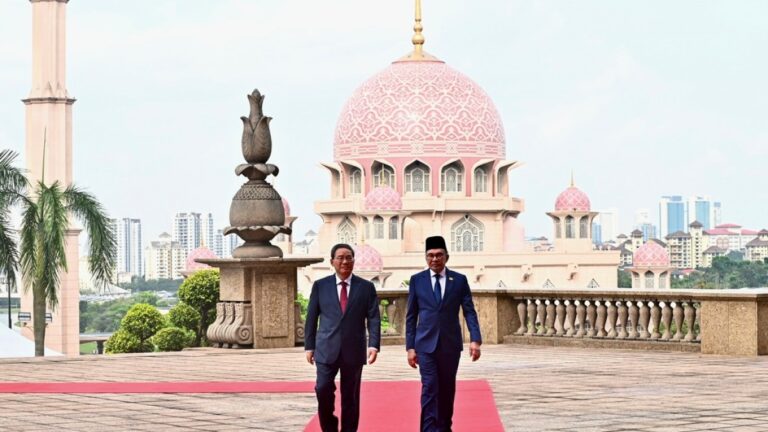Before China’s Li’s visit, Malaysian Prime Minister expressed his desire to join the South in the BRICS alliance.
China and Malaysia have agreed to renew a five-year economic and trade cooperation agreement.
The agreement, which will deepen relations between the two countries as they mark 50 years of diplomatic ties, was signed during a trip by Chinese Premier Li Qiang on Wednesday. The visit to Putrajaya, Malaysia’s administrative capital, was the latest stop on a regional trip aimed at expanding China’s influence in the Asia-Pacific region as geopolitical tensions with the United States rise.
“China is willing to work with Malaysia,” Li said as host Malaysian Prime Minister. Anwar Ibrahimrolled out the red carpet for his arrival the evening before.
“China is advancing Chinese modernization on all fronts through high-quality development. Malaysia, for its part, promotes national development…”
After private talks, the two leaders witnessed the signing of various pacts, including the economic and trade agreement. Officials said the deal would strengthen ties between industries in priority sectors such as high-end manufacturing and the digital economy.
Other agreements signed aim to promote investments in green development, fight transnational crime and stimulate housing and urban development, higher education, people-to-people exchanges in the fields of science and technology. technology, tourism and cultural cooperation, Anwar’s office said.
‘Glimmer of hope’
Although trade was publicly at the top of the agenda, Anwar’s comments before the negotiations hinted at the geopolitical dimension.
In a interview broadcast ahead of Li’s visit, he told Chinese media that Malaysia plans to join the BRICS bloc of developing economies once it receives comments from South Africa’s current president on his protest of interest.
He expressed support for the bloc’s agenda for the South, targeting a “Western narrative” on Israel’s war on Gaza, which he said focuses excessively on Hamas’ attack on Israel on October 7.
China’s rise, he said, “has given us a glimmer of hope that there are checks and balances in the world.”
During Li’s three-day visit to Malaysia, which followed visits to New Zealand and AustraliaKuala Lumpur and Beijing are also expected to discuss the thorny issue of territorial claims in the South China Sea.
Malaysia, along with Vietnam, Brunei, the Philippines and Taiwan, dispute Beijing’s claims to almost the entire South China Sea.
However, unlike the highly publicized clashes between Philippines and China, the Malaysian government prefers the diplomatic route and rarely criticizes Beijing, even when Chinese coast guard vessels have sailed near Malaysian waters.
This is partly aimed at protecting economic ties. China has been Malaysia’s largest trading partner since 2009, with total trade reaching 450.84 billion ringgit ($98.90 billion) last year.
Malaysian Foreign Minister Mohamad Hassan said his country sought to “build” on the cooperation established in the mid-1970s. “The good relations we have maintained since then will enable us to manage and resolve any problem at hand. amicable,” he told The Star newspaper.
Li is also expected to meet Malaysia’s King Sultan Ibrahim on Wednesday and attend a groundbreaking ceremony at a construction site for the East Coast Rail Link (ECRL), part of China’s Belt and Road Initiative. and the Road”.


